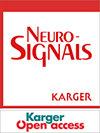Regulator of G protein signaling transcript expression in human neural progenitor differentiation: R7 subfamily regulation by DNA methylation.
Q1 Medicine
引用次数: 12
Abstract
G protein-coupled receptors (GPCRs) and their ligands are critical regulators of neural progenitor differentiation, and GPCR signaling pathways are regulated by regulator of G protein signaling (RGS) proteins. RGS protein expression is dynamically regulated, and we have recently described the epigenetic regulation of RGS transcript expression. Given the potential of RGS proteins to regulate GPCR signaling and the established role of epigenetic regulation in progenitor differentiation, we explored the impact of epigenetic regulation of RGS transcripts during in vitro differentiation of human neural progenitors. Here, we demonstrate robust upregulation of the RGS transcripts RGS4, RGS5, RGS6, RGS7, and RGS11 during neuronal differentiation, while DNA methyltransferase (DNMT) and histone deacetylase enzyme expression is suppressed during differentiation. Transcripts encoding R7 subfamily RGS proteins and the R7-binding partners R7BP and R9AP showed the greatest upregulation. Further, we showed that direct pharmacological inhibition of DNMT activity enhances expression of RGS2, RGS4, RGS5, RGS6, RGS7, RGS8, RGS9L, RGS10, and RGS14 as well as R7BP and R9AP transcripts in progenitors, consistent with regulation by DNMTs. Our results reveal marked upregulation of RGS expression during neuronal differentiation and suggest that decreased expression of DNMT enzymes during differentiation contributes to upregulation. © 2014 S. Karger AG, BaselG蛋白信号转录物在人神经祖细胞分化中的表达调控:R7亚家族通过DNA甲基化调控。
G蛋白偶联受体(GPCR)及其配体是神经祖细胞分化的重要调节因子,GPCR信号通路受G蛋白信号调节因子(RGS)蛋白调控。RGS蛋白的表达是动态调控的,我们最近描述了RGS转录物表达的表观遗传调控。鉴于RGS蛋白调控GPCR信号的潜力以及表观遗传调控在祖细胞分化中的作用,我们探索了RGS转录物的表观遗传调控在人类神经祖细胞体外分化中的影响。在这里,我们证明了在神经元分化过程中RGS转录物RGS4、RGS5、RGS6、RGS7和RGS11的显著上调,而DNA甲基转移酶(DNMT)和组蛋白去乙酰化酶的表达在分化过程中受到抑制。编码R7亚家族RGS蛋白和R7结合伙伴R7BP和R9AP的转录本上调幅度最大。此外,我们发现直接药理抑制DNMT活性可增强祖细胞中RGS2、RGS4、RGS5、RGS6、RGS7、RGS8、RGS9L、RGS10、RGS14以及R7BP和R9AP转录本的表达,与DNMT的调控作用一致。我们的研究结果表明,在神经元分化过程中RGS的表达显著上调,并表明分化过程中DNMT酶的表达降低有助于上调。
本文章由计算机程序翻译,如有差异,请以英文原文为准。
求助全文
约1分钟内获得全文
求助全文
来源期刊

Neurosignals
医学-神经科学
CiteScore
3.40
自引率
0.00%
发文量
3
审稿时长
>12 weeks
期刊介绍:
Neurosignals is an international journal dedicated to publishing original articles and reviews in the field of neuronal communication. Novel findings related to signaling molecules, channels and transporters, pathways and networks that are associated with development and function of the nervous system are welcome. The scope of the journal includes genetics, molecular biology, bioinformatics, (patho)physiology, (patho)biochemistry, pharmacology & toxicology, imaging and clinical neurology & psychiatry. Reported observations should significantly advance our understanding of neuronal signaling in health & disease and be presented in a format applicable to an interdisciplinary readership.
 求助内容:
求助内容: 应助结果提醒方式:
应助结果提醒方式:


